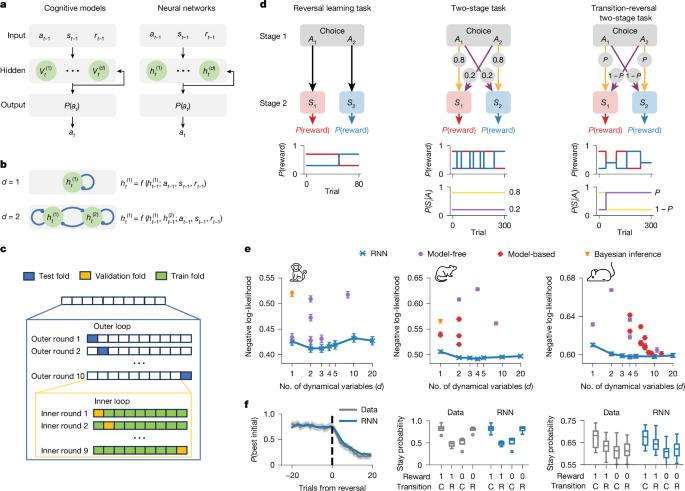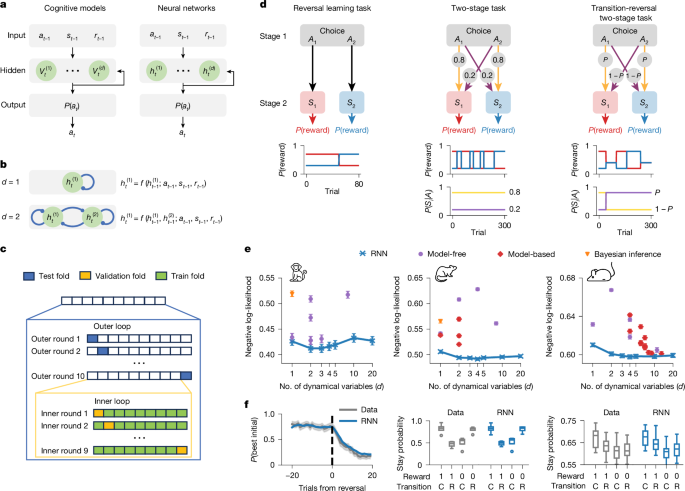用微小的循环神经网络发现认知策略
IF 48.5
1区 综合性期刊
Q1 MULTIDISCIPLINARY SCIENCES
引用次数: 0
摘要
了解动物和人类如何从经验中学习并做出适应性决策是神经科学和心理学的一个基本目标。规范的建模框架,如贝叶斯推理和强化学习,对控制适应性行为的原则提供了有价值的见解。然而,这些框架的简单性往往限制了它们捕捉现实生物行为的能力,导致人工调整的循环,这容易导致研究人员的主观性。在这里,我们提出了一种新的建模方法,利用递归神经网络来发现控制生物决策的认知算法。我们表明,只有一到四个单元的神经网络在预测个体动物和人类的选择方面通常优于经典的认知模型,并与更大的神经网络相匹配,在六个经过充分研究的奖励学习任务中。关键的是,我们可以使用动态系统概念来解释训练后的网络,从而实现认知模型的统一比较,并揭示选择行为背后的详细机制。我们的方法还估计了行为的维度,并为元强化学习人工智能代理学习的算法提供了见解。总的来说,我们提出了一种系统的方法来发现决策中可解释的认知策略,为神经机制提供了见解,并为研究健康和功能失调的认知奠定了基础。本文章由计算机程序翻译,如有差异,请以英文原文为准。


Discovering cognitive strategies with tiny recurrent neural networks
Understanding how animals and humans learn from experience to make adaptive decisions is a fundamental goal of neuroscience and psychology. Normative modelling frameworks such as Bayesian inference1 and reinforcement learning2 provide valuable insights into the principles governing adaptive behaviour. However, the simplicity of these frameworks often limits their ability to capture realistic biological behaviour, leading to cycles of handcrafted adjustments that are prone to researcher subjectivity. Here we present a novel modelling approach that leverages recurrent neural networks to discover the cognitive algorithms governing biological decision-making. We show that neural networks with just one to four units often outperform classical cognitive models and match larger neural networks in predicting the choices of individual animals and humans, across six well-studied reward-learning tasks. Critically, we can interpret the trained networks using dynamical systems concepts, enabling a unified comparison of cognitive models and revealing detailed mechanisms underlying choice behaviour. Our approach also estimates the dimensionality of behaviour3 and offers insights into algorithms learned by meta-reinforcement learning artificial intelligence agents. Overall, we present a systematic approach for discovering interpretable cognitive strategies in decision-making, offering insights into neural mechanisms and a foundation for studying healthy and dysfunctional cognition. Modelling biological decision-making with tiny recurrent neural networks enables more accurate predictions of animal choices than classical cognitive models and offers insights into the underlying cognitive strategies and neural mechanisms.
求助全文
通过发布文献求助,成功后即可免费获取论文全文。
去求助
来源期刊

Nature
综合性期刊-综合性期刊
CiteScore
90.00
自引率
1.20%
发文量
3652
审稿时长
3 months
期刊介绍:
Nature is a prestigious international journal that publishes peer-reviewed research in various scientific and technological fields. The selection of articles is based on criteria such as originality, importance, interdisciplinary relevance, timeliness, accessibility, elegance, and surprising conclusions. In addition to showcasing significant scientific advances, Nature delivers rapid, authoritative, insightful news, and interpretation of current and upcoming trends impacting science, scientists, and the broader public. The journal serves a dual purpose: firstly, to promptly share noteworthy scientific advances and foster discussions among scientists, and secondly, to ensure the swift dissemination of scientific results globally, emphasizing their significance for knowledge, culture, and daily life.
 求助内容:
求助内容: 应助结果提醒方式:
应助结果提醒方式:


